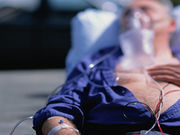Forty-six percent of shock events have related health care use, with cardiac catheterization common
WEDNESDAY, Feb. 15, 2017 (HealthDay News) — Health care utilization (HCU) is common after appropriate and inappropriate implantable cardioverter-defibrillator shock events, according to a study published online Feb. 14 in Circulation: Cardiovascular Quality and Outcomes.
Mintu P. Turakhia, M.D., from Stanford University School of Medicine in California, and colleagues conducted a retrospective cohort study of patients with implantable cardioverter-defibrillators identified from commercial and Medicare claims databases linked to adjudicated shock events from remote monitoring data. Based on inpatient and outpatient claims within seven days after a shock event, they ascertained shock-related HCU.
The researchers found that 963 (9.4 percent) of 10,266 linked patients had 1,885 shock events (56, 38, and 6 percent were appropriate, inappropriate, and indeterminate, respectively). Forty-six percent of these events had shock-related HCU (14 and 32 percent inpatient and outpatient, respectively). Inpatient cardiovascular procedures were common after shocks, including echocardiography, electrophysiology study or ablation, stress testing, and lead revision (59, 34, 16, and 11 percent, respectively). After appropriate and inappropriate shocks, cardiac catheterization was common (71 and 51 percent, respectively), while percutaneous coronary intervention was low (6.5 and 5 percent, respectively). There was no significant difference in expenditures related to appropriate and inappropriate shocks.
“Use of invasive cardiovascular procedures was substantial, even after inappropriate shocks, which comprised 38 percent of all shocks,” the authors write.
Several authors disclosed financial ties to Medtronic and St. Jude Medical.
Full Text (subscription or payment may be required)
Copyright © 2017 HealthDay. All rights reserved.








